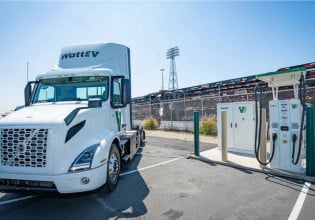Tata Group Building UK EV Battery Gigafactory
After months of negotiations, the owner of Jaguar Land Rover has officially announced plans to build a battery plant in England, allowing Britain to remain competitive in the electric car industry.
Tata Group, the parent company to Jaguar Land Rover, has finalized its plans to build a £4 billion ($5.2 billion) electric car battery gigafactory in western England.
Land Rover. Image used courtesy of Unsplash
After nine months of negotiations to obtain state aid, the multi-industry conglomerate chose the United Kingdom over a competitive site in Spain. The gigafactory – built in Somerset beginning in 2026 – is expected to generate 40 gigawatt-hours (GWh) of batteries each year, enough to power a few hundred thousand electric vehicles (EVs).
Bold EV Moves for Jaguar Land Rover
Among luxury automotive brands, Jaguar Land Rover (JLR) is breaking away from the pack by taking a bold stride toward upscale EVs through their commitment to the battery plant.
Other luxury brands, like Maserati and Aston Martin, have been more cautious in embracing plans for an electrified future. This hesitancy is partly due to their smaller customer bases and higher production costs, which raise concerns about the initial investment required for transitioning to electric vehicles.
However, luxury automakers will be unlikely to avoid the impact of government regulations aimed at promoting electrification in the coming decades.
JLR already offers the Jaguar I-Pace and a handful of plug-in and mild hybrid models from Land Rover.
Before the finalization of the UK plant, JLR CEO Thierry Bolloré made optimistic claims about transitioning Jaguar to a fully electric lineup and Land Rover introducing five battery electric vehicles (BEVs) by 2025. Some industry experts have expressed skepticism about the feasibility of these goals, but JLR remains confident in its capabilities.
To further its commitment to the electric transition, JLR announced a substantial $19.4 billion investment to achieve complete carbon neutrality by 2039, aiming to eliminate tailpipe emissions by 2036.
Auto Manufacturing in Britain
The construction of this plant has the potential to reestablish Britain as an automotive manufacturing hub, especially as the transition to EVs continues.
Last year, Jaguar Land Rover produced nearly 203,000 vehicles in Britain, making it the country's second-largest automaker behind Nissan. However, the overall car production in Britain has declined significantly, dropping to 775,000 vehicles in 2022 from a peak of over 1.7 million vehicles in 2016. This decline represents a substantial decrease in the country's automotive manufacturing output over the past few years.
Jaguar. Image used courtesy of Unsplash
Recently, concerns have arisen over the potential impact of the transition to electric vehicles on Britain's car industry, especially in light of the country's departure from the European Union, which has been the primary export market for British-made cars.
The presence of a significant domestic battery manufacturer alleviates carmakers' worries, as they will no longer need to import batteries and deal with substantial EU tariffs or expensive transportation costs for the equipment.
Nissan currently owns the only other battery facility in the UK. The new battery facility is projected to have an annual output of 40 gigawatt-hours, a significant investment that British officials believe will fulfill nearly half of the country's battery production requirements to achieve its 2030 net zero-emissions goals. Despite facing competition from the US and neighboring EU countries like Germany and Spain, the UK has not always appeared eager to embrace such gigafactories, except for the modest Nissan facility, mainly due to the absence of subsidies.
However, British Prime Minister Rishi Sunak and Investment Minister Dominic Johnson agreed this deal would play a crucial role in bolstering the nation's economy. Johnson expressed optimism about a potential resurgence in car production, aiming to return to peak levels within five to ten years. The news of being in contention for this significant investment has already sparked interest from other companies, demonstrating the positive impact this development could have on the UK's automotive sector and the broader economy.
Regarding the future of the automotive industry in the UK, it could be advantageous to attract popular EV brands like Tesla and China's BYD to establish a presence in the country.








